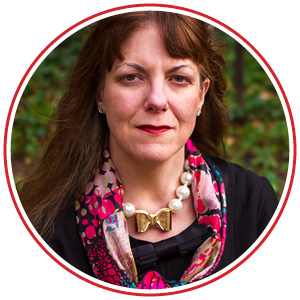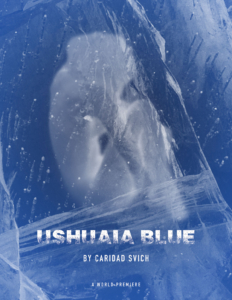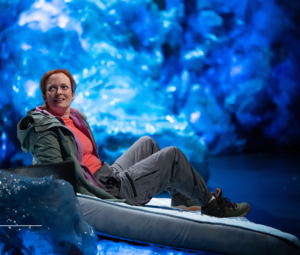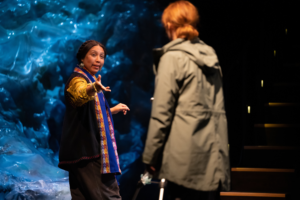PLAYWRIGHT INTERVIEWS
Interviews conducted and edited by Colin McGuire.
Caridad Svich is a busy woman. Not only does she have a play, Memories Of Overdevelopment, that will begin streaming worldwide July 14, but she also hopes she can soon find time to dedicate toward her next project, Chelsea And Ivanka, a story about, you guessed it, Chelsea and Ivanka. Oh, and then there’s this tiny little world premiere she’s staging as part of this year’s CATF slate, Ushuaia Blue, a story set in Argentina that examines love, tragedy, and Antarctica’s fragile environment. Inspired by months of interviews that Svich conducted with marine biologist Dr. James McClintock, the production helped the playwright achieve her goal of setting a story in her father’s native land. “My dad’s from Argentina and I always wanted to write something that was set or partially set in Ushuaia,” she explained recently, “and I never found the right container for it. Suddenly, I was like, ‘Oh my gosh, this is serendipity.'” The following is the text of the full conversation between CATF and Svich:
Let’s start with something basic. I’ve read a little bit about the play and I was just wondering how you dreamt this up to begin with?
It’s a slightly complicated story. I was commissioned by the University of Alabama at Birmingham to write it. It was based on interviews I conducted with one of their esteemed professors in their biology department, James McClintock, who is a marine biologist and climate scientist. He met me because he saw a reading of my play The Way Of Water, which is about the aftermath of the Deep Water Horizon disaster. He remembered it and loved it and wrote me a note saying, “Hi, I really like that play, I’ve been thinking about it and I wonder if there’s a way we can work together.” I replied. We met, and then it just took off from there. Thankfully, everyone said yes.
I interviewed him for about two, three months and then I went away and thought about what I wanted to make. I knew that some aspect of the climate emergency would be the focus because that’s a shared concern of ours. Then, I also wanted to incorporate … he does most of his research work in Antarctica and I thought, “Well, this is awesome,” because you don’t see a lot of plays there are set there. In the middle of all that, I remembered that Ushuaia is the last city at the southernmost tip of Argentina. My dad’s from Argentina and I always wanted to write something that was set or partially set in Ushuaia and I never found the right container for it. Suddenly, I was like, “Oh my gosh, this is serendipity.” Not only can I write about subjects that I love and I’m interested in, but finally, I get to respond to Ushuaia, so it was a wonderful convergence. Then, I was really determined to write a love story. I wanted people to be moved and I think writing pieces about the climate emergency is difficult because there’s a danger of audiences feeling like they’re being lectured. Sometimes, I know theatrically, it’s not that cool. So, I was like, “Oh, a love story, though!” Because everyone has fallen in love or out of love, and I thought, that’s a way in. From there, it sort of wrote itself, weirdly.
Is this the first time you wrote a play after spending time with someone and interviewing them? Have you done anything like this before?
I’ve done three projects with universities where we sort of devised the work through images and movement. We usually write a theme. The process has been similar, but slightly different. In this case, I wasn’t in the rehearsal room, building things and then running away and writing. I was with Jim and then I went away and wrote. With the other processes, we were playing in the room and then I went away and thought about it and made something. When I wrote The Way Of Water, I was partially also inspired by interviews, so it’s kind of like I have a foot in that realm as a writer. I think it’s fair to say this is the first time where it’s been a one-on-one. Jim is also a writer. He’s written non-fiction books about his research to reach a wider audience. He loves plays and theater and music, so I felt I was also working with someone who understood something about what the writing process entails.
I’m kind of wondering where the love component came in here with this story. It’s almost like you chose to use that as a way to deliver a bigger message. Is romance something you write about easily? Is that something that comes to you naturally?
No, I don’t write a lot of love stories. I think about every five years, I write a love story. The one I wrote prior to Ushuaia Blue is called Archipelago, which is a two-hander and it got done in the UK. Love stories come upon me every once in a while and that was the case here. I just felt a really strong urge to make something that was tender that dealt with vulnerability, and in this case, featuring a relationship that was fraying at the seams. I think I’ve written anti-love stories a lot. And that’s fine, but I love playing every side of the coin, where people are trying to find connection with one another and they’re working things through. The idea of working things through, in these times we are in now, feels kind of important.
Is there a parallel between the climate aspect and the love aspect here, where there’s a fragility in our climate as well as a fragility in the love the characters have?
Yeah, it’s a metaphor, obviously. The characters and their relationship is a vehicle to explore a larger idea about coexistence with the universe. The planet has been sturdy, but it’s become less and less sturdy because of the damage that humans have been doing to it.
So, that metaphor is on purpose, then?
Yeah, for sure.
This is the first time you’ve been to CATF?
Yeah, first time.
Had this festival been on your radar prior to this year?
When Ed was the producing director, I think we had been in conversation about other plays of mine for a while. Maybe five or six years. We circled around each other. I have a lot of friends who have been produced at the festival, so I kept hearing about it and I was like, I want to play down there, too. Then, I hadn’t sent them anything in about two years and my agent said, “Maybe we should send them this play,” and I was like, “Oh, I had been looking at another play of mine,” but she said she had a hunch about this one, so she sent it to Ed and Ed was very quick. He called me up and said he wanted to meet with me in New York and he wanted to talk about my play. He was like, “I love this play, I’m passionate about it, we gotta do it.” At that point, it was on my radar. Also, I think with this current landscape in American theater and it going through such a tough time right now, this is one of the few festivals that are left, I’m sorry to say. A lot of them have shuttered or changed what they do. CATF has that sense of destination that’s becoming rarer and rarer, especially in the full production context, as opposed to a reading context, so it’s super important. All power to CATF.
The festival always pushes the notion of thinktheater. I’ve asked this to everyone else, but where do you think your play falls in when it comes to the context of that phrase?
I’m of the mind that most plays are thought experiments, so they’re there to facilitate a dialogue. We’re witness to something, but the real event happens, in a strange sense, after the play is over and the audience is just kind of living with it, carrying it in their souls and bones. That’s where I think the plays really live. The ones that we remember as audience members or practitioners are the ones that stay with us in our souls, so that’s the job. It’s definitely thinking theater.
This story is set in Argentina, and this is a place you’ve always wanted to set a story in — what’s your bucket list for places to set stories in?
Because my dad’s from Argentina, I was kind of kicking myself because I never set a play in Argentina, so I felt like one down. My mom’s from Cuba and there’s a play I was working on that was set in Cuba, but it fell apart, so I still feel like I need to write my Cuba play, just to give some love to my mom. There are a couple of places — I always wanted to set a play in Australia. I’m fascinated by the Australian landscape. Also, Canada is featured in a lot of my writing as a destination point. A lot of my characters are like, “Let’s go to Canada!” So, maybe I should write a play set in Canada at some point. Then, I really wanted to set something in the Outer Hebrides, and I haven’t quite found a container for that yet, but it kind of keeps resurfacing. I’m just trying to find out what the story is.
I’m always curious about what’s next. After CATF, what do you have cooking? What’s going to take your attention after this festival?
I actually have a play that’s streaming starting July 14 through August 3, Memories Of Overdevelopment. I worked on it at the Goodman Theatre in Chicago and it will stream from the Workshop Theater in New York. It’s still in development, in a way. It’s a play that’s a film, so we’re trying to figure out ways of how to … I keep fussing with it to kind of work on the cinematic language of it. This version, we actually shot in a film studio. We literally finished the shoot two weeks ago. I’m super psyched about that. Hopefully, it will find an audience. Then, I have a play called Chelsea and Ivanka, which is about, well, Chelsea and Ivanka, and their friendship, but also about the state of the world. That play is really on my front-burner right now as a writer. I’ve had four premieres this year, from February to now, back to back, and they’re all new plays. So, I just feel a little bit like, “Oh my God.” It’s very exciting to visit all these different worlds as a writer, but at the same time, I’m like OK … .” One thing I want to do is take care of all these beautiful plays I have that I hope have future lives, but immediately next on the list is Memories Of Overdevelopment and then I’ll be trying to find some developmental time for Chelsea and Ivanka.




